Introduction to Marjorie Ellingham
00:00:10
Speaker
Welcome to Clued in Mystery. I'm Sarah. And I'm Brooke and we both love mystery. Hi Brooke. Hi Sarah. Are you ready to talk about another Golden Age author today? I am and I'm very excited to talk about Marjorie Ellingham. Yes I am too and I can't wait for you to tell us all about her and her background.
Early Life and First Works
00:00:32
Speaker
Okay so I will start with that.
00:00:36
Speaker
Considered one of the Golden Ages, four queens of crime, along with Dorothy L. Sayers, Nyo Marsh, and Agatha Christie, Marjorie Louise Ellingham was born May 6th, 1904. Her sleuth, Albert Campion, first appeared in her third novel in 1929, and it was titled The Crime at Black Deadly, though he was really just a side character. He would go on to feature in 19 of her novels and several of her short stories.
00:01:06
Speaker
Inspired by her parents, who were both writers, and her aunt, who was an editor and founder of magazines that Marjorie later wrote for, Ellingham wrote from a young age and in her teens began submitting her work to publishers. She wrote her first novel, which was a supernatural tale, while on holiday with her parents.
Personal Life and Social Scene
00:01:24
Speaker
The Blacker Chief Dick was published in 1923, though later in life she would buy any copies she found to prevent others from getting them.
00:01:33
Speaker
She married Philip, or Pip, Youngman Carter in 1927. Carter had a large social circle, and while they lived in London, they entertained frequent gatherings of what was referred to as the gang. The couple did not have children, but hosted what seemed like a nearly continuous stream of visitors. One house guest, a friend of her husband, lived with the couple for 13 years.
00:01:56
Speaker
Pip was an artist, though according to Martha Haley Dubose in her book, Women of Mystery, he spent considerably more time socializing than creating in the early years of their marriage. Martin Edwards, however, suggests in The Golden Age of Murder that Pip's contributions are underrepresented. He drew the illustrations that appeared on the dust jackets of his wife's books, as well as other Golden Age authors, and her private papers indicate that the two of them collaborated, at least on her first novel featuring Albert Campion.
War Efforts and Writing Career
00:02:23
Speaker
The couple purchased a large house in the Essex village of Tolson Darcy in 1934. It was previously the home of an elderly friend of Ellingham's mother, Em, who was disappointed when she wasn't left the house when the friend died. Her fondness for the house probably made it easier when she moved in with her daughter following the death of Marjorie's father. Marjorie's aunt and sister also joined the household, which Marjorie supported through her writing.
00:02:51
Speaker
Also in 1934, she joined the detection club during a ceremony that was broadcast internationally by BBC Radio. According to her private notes, she was uncomfortable and intimidated by the other attendees throughout the event. The Second World War marked a turning point for Ellingham. Pip was successful as an officer in North Africa, and she became involved in the home front and opened their house and participated in the local community, something she had previously avoided.
Challenges in Later Life
00:03:17
Speaker
After the war, Pip lived in London where he was increasingly open about his infidelity. He wrote and edited for magazines while she continued to write and live in Essex. Despite her success, money was a near constant worry, which isn't surprising given that she funded Pip's lavish lifestyle even after he was earning money. Her tax issues came to a head during the war and her frustration about this features in at least one of her novels.
00:03:44
Speaker
Ellingham suffered from undiagnosed health problems that affected her throughout her life. Her underactive thyroid left her overweight, which is something that made her self-conscious. She was also considered to be prone to violent mood swings, but they were the result of her being bipolar, a diagnosis she only received shortly before she died. And I suspect that if both conditions had been managed appropriately, she would have been a much happier person. She died in 1966 of breast cancer.
00:04:12
Speaker
During the last few years of her life, she seemed to reconcile with her husband. And after she died, he finished her final Campion novel and wrote two of his own, leaving a third unfinished when he died.
Continuation of Campion's Legacy
00:04:22
Speaker
It was finished by Mike Ripley in 2014 with the support of Ellingham's estate. And Ripley has gone on to write eight more. I'm thrilled to share a book that he will be joining us in a future episode to discuss Marjorie Ellingham and Albert Campion.
00:04:36
Speaker
Thank you, Sarah. Yes, that is fantastic news and we'll be looking forward to that episode so very much.
Analyzing Writing Style and Influence
00:04:44
Speaker
Sarah, in your research, did you find out anything about how Allingham, like what her writing process was?
00:04:51
Speaker
Yeah. So there was a reference to her early novels that I think she described as being, uh, like making a pudding. And I think that means she just kind of threw everything and into the bowl and saw what, what came out. Um, but I think as she matured as a writer, she did kind of her writing process matured as well.
00:05:15
Speaker
I think that you can really tell that she comes, in my opinion, that she comes from a family of writers when you read her work because she's very eloquent. Her descriptions are very clear and really charming. I really enjoyed the way that she would describe something or use metaphors and similes. You could tell that she was an educated person in the art of writing.
00:05:44
Speaker
I definitely agree. And one of my favorite lines that I came across while reading her to prepare for this comes from the traitor's purse. And the line, it made me laugh. She goes, it seems that the great starry arc of the sky above him reeled over and back like the lid of a bacon dish.
00:06:05
Speaker
There are so many of those. I would have highlighted gobs if I had been reading a physical book, but I was doing an audio book. But one that I wrote down was, he had a curious bird-like voice. The likeness was enhanced by his habit of speaking in little staccato sentences and holding his head slightly to one side.
00:06:31
Speaker
It's so descriptive, right? And you can immediately picture exactly what she was intending. So what of her works did you read or listen to?
Notable Novels and Narrative Style
00:06:46
Speaker
So I decided to pick something that was kind of in the middle of her works. And so I picked Sweet Danger. It falls a little bit to the beginning. It's in 1933 is when she published that one. I will say it is still ranked just 113 in the mystery and crime books on Amazon. So this book is still being widely read, but this is a
00:07:11
Speaker
treasure hunt sort of story. And there's issues of inheritance and ownership and old documents. And it was a really great choice for me. It actually reminded me a lot of what I love about Robert Goddard, who we talked about in a recent episode, that kind of piecing together the past to solve a problem. There wasn't necessarily a murder mystery in this one.
00:07:38
Speaker
Well, and so there's a couple of things that I noticed about her, both in my research and in the things that I read. So the first is Campien, her sleuth. He's not always a sleuth, right? In the beginning,
00:07:58
Speaker
It's kind of fuzzy what his position is. And I think he's described as perhaps being a member of the royal family, a disgraced member, or maybe his branch of the family has been disgraced from the royal family. But he's certainly got some connections. And as the books progress, he
00:08:24
Speaker
progresses in his life. So unlike Poirot, who just is always this retired Belgian detective, we see Campion get married and he kind of grows as a person, I think.
00:08:41
Speaker
And yeah, some of his books, he's more of a detective. He's kind of working with the police and some are, like you said, it's more of an adventure. One of the books that I read was Mystery Mile, which was the second book that Campion appears in.
00:08:56
Speaker
And it's kind of this like wild adventure that he takes people on. But then in Death of a Ghost, which was published a little deeper into the series in 1934, it's more of a murder mystery.
Character Study: Albert Campion
00:09:15
Speaker
And so there's like a lot of variety in terms of just even that particular character in the books that he's featured in.
00:09:23
Speaker
Yeah, I think that's very unique, not that she would write different kinds of mysteries because we've noticed that in other authors of her era, but that she used the same character in these different types of mysteries. And yeah, I also discovered that people said that she's
00:09:43
Speaker
not nearly as repetitive you know there's really no formula to her stories you're gonna get maybe something different each time and that includes as you said that the sleuth adapted very much over the years so in sweet danger which was the the novel that i read that is the story where he meets amanda.
00:10:03
Speaker
and it's her family that he is solving the mystery for. And I really liked the ending of this. Amanda really saves the day. She saves his life at the end and then asks him to promise her to when she gets a little older that they can be partners. And then as you said later, that's who he marries. He marries this character Amanda. It's a really
00:10:26
Speaker
interesting way that she sprinkled their relationship over I think three or four different books and then they finally marry and have a son. Yeah. And so I haven't finished yet reading Traitor's Purse, but in that one, it opens with him kind of recovering from having lost consciousness and lost his memory and he doesn't
00:10:50
Speaker
He has to figure out who these various people are. And he sees Amanda and he thinks he might know her, but he's not entirely sure. So there's a lot going on in that particular book. How fun. That's an interesting way to keep the will they, won't they of a romance going is one of them doesn't even remember the other one of cute. Yeah.
00:11:16
Speaker
So what did you think about Albert Campion as the sleuth? I think because he seems to be different in each book that I've read. So it's really hard to kind of peg him as anything in particular. Him as a sleuth, he was very different from characters that Christie or Niamharsh or Sayers or any of the other Golden Age authors like created, right? Because he was
00:11:44
Speaker
kind of different in each, certainly in the books that I read. Yeah, that makes sense. I don't have a big enough experience I think to really form an opinion, but I will say that I was struck by the fact that she doesn't necessarily make him this like larger than life hero. You know, he's not perfect. He's not exceedingly handsome or, you know,
00:12:06
Speaker
incredibly smart. He's kind of an everyman and I'm not sure if that carries over into all the other titles but I liked that. I know that he has been compared a lot to Lord Peter Whimsy but to me they are quite different.
00:12:24
Speaker
Yeah, he didn't feel the same that Whimsy feels. I didn't mention it in the introduction, but Ellingham wrote several other pieces as well, several other books.
Other Literary Contributions
00:12:39
Speaker
She did write a nonfiction account of her community coming together during World War II, and that's called Oaken Heart.
00:12:47
Speaker
And she wrote several plays. She wrote a few romantic thrillers under a pen name Maxwell Marsh, and those were in the 1930s. And generally, I think her writing is considered to explore some darker themes than those that are associated with the Golden Age.
00:13:10
Speaker
Yeah and I also read that in order to like as you said she was the breadwinner not only for her household but actually she supported many people and that she did do other writing in the serials under a pen name much like her journalist dad and other members of her family so
00:13:31
Speaker
With thinking about how lovely her writing is, I can only imagine how good that book is and how meaningful that could be to, you know, and to learn about that part of our history. So Sarah, has any of her work been adapted for screen?
Adaptations and Their Impact
00:13:47
Speaker
Yeah, so not a lot of it. There were screen adaptations of two of her novels in 1959 and 1960. And I think those might have been the only screen adaptations that she would have seen before she died. 30 years later, BBC adapted the first eight novels over two seasons under the name Campion.
00:14:14
Speaker
And those are available on Britbox. I've watched a couple of those. And I believe there have also been some radio play adaptations, but there really hasn't, you know, you think about Christie and there's been so many adaptations of her work. There just hasn't been a ton of of Allingham's work.
00:14:40
Speaker
But it's interesting that the estate is still interested in continuing this series. I mean, as you said, we will have Mike Ripley on later to talk about his continuation of the stories. And that's vastly different from somebody, say, like Dorothy Sayers.
00:14:58
Speaker
I think it's really fascinating that her husband initially continued her stories, right? So when she died, there was an unfinished manuscript. He finished it off. And then I think he wrote two or three additional Campion novels before he died. And when he died, he'd left an unfinished novel that Mike Ripley finished. And then he's gone on to write some that are entirely his own work.
00:15:24
Speaker
So, I think that that's a really interesting trajectory.
Posthumous Works and Legacy
00:15:30
Speaker
Absolutely. It's fascinating. And I think it really gives credence to the fact that her husband Pip was actually very involved in her, at least for periods of their lives, involved in her writing because not just anyone would be able to
00:15:46
Speaker
pick up and continue the story. So definitely was probably like helping her plot some of her other stories or, you know, talking about characters and things. So yeah, that is just fascinating, isn't it?
00:16:03
Speaker
I have to say that of the golden age queens of crime, she's the one that I knew the least about, you know, Agatha Christie, obviously taking first place. You know, you said that her books are still in kind of that top 100, top 200. But I don't hear anybody really talking about her.
Legacy Among Contemporaries
00:16:28
Speaker
I would agree. And especially
00:16:32
Speaker
Once again, that because the series is continuing to be written, um, it's, it's very interesting that some of these names of these people who are wildly popular, um, in their era have, have dropped out of Vogue. And I'm just happy that you and I, Sarah can talk about them and maybe bring them back to the mystery lovers TBR lists. Agreed.
00:16:59
Speaker
Well, Sarah, thank you for such a lovely summary of Marjorie Allingham, and we will look forward to part two coming very soon. Thanks, Brooke.
Conclusion and Listener Engagement
00:17:08
Speaker
And thank you everyone for listening today to Clued in Mystery. I'm Brooke. And I'm Sarah, and we both love mystery. Clued in Mystery is written and produced by Brooke Peterson and Sarah M. Steven. Music is by Shane Ivers. If you liked what you heard, please consider telling a friend, leaving a review, or subscribing with your favorite podcast listening app. Visit our website at cluedinmystery.com to sign up for our newsletter, The Clued in Chronicle, or to join our paid membership, The Clued in Cartel.
00:17:38
Speaker
We're on social media at Clued In Mystery.

![[Re-release] Anthony Berkeley image](https://media.zencastr.com/cdn-cgi/image/width=112,quality=85/image-files/61e1c276e3ec42007857cff9/e7c778ac-a2ba-4809-9a5c-7cd39d167834.jpg)
![[Bonus] Wake Up Dead Man image](https://media.zencastr.com/cdn-cgi/image/width=112,quality=85/image-files/61e1c276e3ec42007857cff9/e276ac32-e664-464f-956c-7699bdb60aa5.jpg)
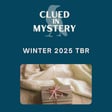

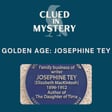
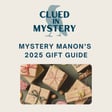
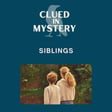

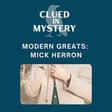

![[Bonus] Read Along: Daughter of Time image](https://media.zencastr.com/cdn-cgi/image/width=112,quality=85/image-files/61e1c276e3ec42007857cff9/b953ad72-c43e-48ca-a18a-b3c216ab90ee.jpg)

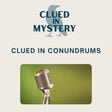
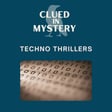



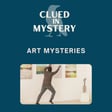

![[Bonus] Thursday Murder Club preview image](https://media.zencastr.com/cdn-cgi/image/width=112,quality=85/image-files/61e1c276e3ec42007857cff9/e51be644-e446-4d32-b89c-12bfc60d30e9.jpg)